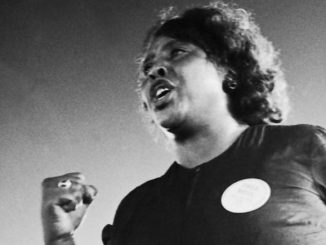For those who are determined in their fight to bring about a society free from discrimination and inequality, their political views are rarely stagnant. The more we struggle, the more we organize with others, the more we study the past – the more our views evolve. Both Malcolm X and Martin Luther King Jr. were determined in their efforts, and their views continued to evolve as new events sharpened their understanding. Their lives were cut short from assassination at the age of 39, when they both still had so much more to contribute to the fight for a better world. We reprint some of their last speeches here.
Malcolm X
Born: May 19, 1925
Died: February 21, 1965
Last month marked fifty years since his assassination.
It is impossible for capitalism to survive, primarily because the system of capitalism needs some blood to suck … it’s more like a vulture and can only suck the blood of the helpless. As the nations of the world free themselves, then capitalism has less and less victims, less to suck, and it becomes weaker and weaker… You show me a capitalist, I’ll show you a bloodsucker… It’s only a matter of time in my opinion before it will collapse completely. (December, 1964)
I believe that there will ultimately be a clash between the oppressed and those that do the oppressing. I believe that there will be a clash between those who want freedom, justice, and equality for everyone and those who want to continue the systems of exploitation… It is incorrect to classify the revolt of the Negro as simply a racial conflict of black against white, or as a purely American problem. Rather, we are today seeing a global rebellion of the oppressed against the oppressor, the exploited against the exploiter. (January, 1965)
Most of the countries that were colonial powers were capitalist countries and the last bulwark of capitalism today is America and it’s impossible for a white person today to believe in capitalism and not believe in racism. You can’t have capitalism without racism. And if you find a person without racism and you happen to get that person into conversation and they have a philosophy that makes you sure they don’t have this racism in their outlook, usually they’re socialists or their political Philosophy is socialism. (January, 1965)
Martin Luther King Jr.
Born: January 15, 1929
Died: April 4, 1968
The problems we are dealing with are not going to be solved until there is a radical redistribution of economic and political power. All I have been doing in trying to correct this system in America has been in vain. The whole system will have to be done away with… I knew I could never again raise my voice against the violence of the oppressed in the ghettos without having first spoken clearly to the greatest purveyor of violence in the world today, my own government… Our only hope today lies in our ability to recapture the revolutionary spirit and go out into a sometimes hostile world declaring eternal hostility to poverty, racism, and militarism. With this powerful commitment we shall boldly challenge the status quo, we shall boldly challenge unjust mores, and thereby speed up the day when “every valley shall be exalted, and every mountain and hill shall be made low, and the rough places shall be made plain, and the crooked places straight.” (April, 1967)
There is something wrong with capitalism… The evils of capitalism are as real as the evils of militarism and racism… There are forty million poor people here, and one day we must ask the question, “Why are there forty million poor people in America?”And when you begin to ask that question, you are raising a question about the economic system, about a broader distribution of wealth. When you ask that question, you begin to question the capitalistic economy. And I’m simply saying that more and more, we’ve got to begin to ask questions about the whole society… When you deal with this, you begin to ask the question, “Who owns the oil?”,”Who owns the iron ore?”. You begin to ask the question, “Why is it that people have to pay water bills in a world that’s two-thirds water?” These are words that must be said. (August, 1967)




